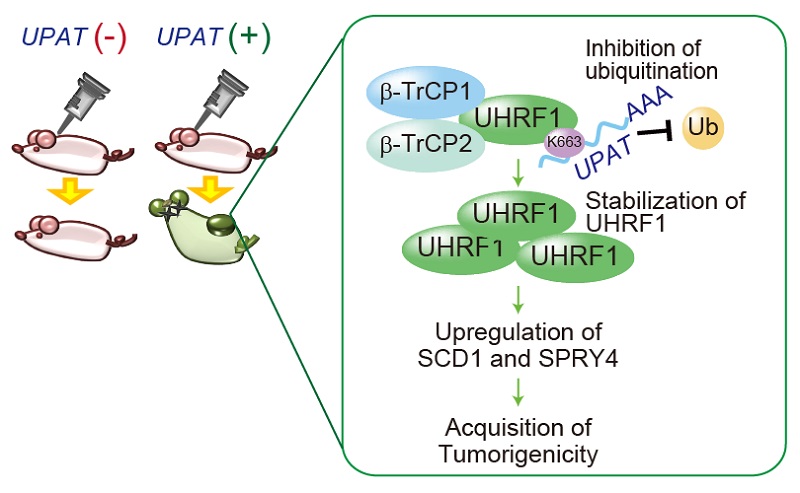Identification of long non-coding RNA critical for development of colorectal cancer Promotes colon tumorigenesis by inhibiting protein ubiquitination


Mechanisms of colon cancer tumor formation in the new lncRNA UPAT
UPAT binds to the epigenetic factor UHRF1 and interferes with its ubiquitination by β-TrCP1 and β-TrCP2. UHRF1 stabilized by UPAT promotes the expression of SCD1 and SPRY4, and thereby regulates the growth and tumorigenicity of colon tumor cells.
© 2016 Tetsu Akiyama.
Researchers at the University of Tokyo have discovered an RNA segment in mice that they have termed UPAT. UPAT is a long non-coding RNA of over 200 bases in length that does not encode a protein and is essential for colon cancer cells to form tumors. UPAT may be a promising molecular target for colon cancer therapies.
The human genome transcribes a large number of non-coding RNAs (ncRNAs), which do not encode proteins. These are classified as small ncRNAs less than 200 bases and long ncRNAs (lncRNAs) longer than 200 nucleotides. In contrast to small ncRNAs, lncRNAs carry out their roles through a variety of disparate mechanisms. Increasing evidence suggests that lncRNAs play critical roles in a diverse set of biological processes, including development, differentiation, embryogenesis, stem cell pluripotency and tumorigenesis.
The research group of Professor Tetsu Akiyama and Assistant Professor Kenzui Taniue at the Institute of Molecular Cellular Biosciences found that UPAT, the lncRNA identified by the group, interacts with and stabilizes the epigenetic factor UHRF1 by by interfering with its ubiquitination. The stabilized UHRF1 promotes the expression of SCD1 and SPRY4, and thereby regulates the growth and tumorigenicity of colon tumor cells.
“This study provides evidence for a lncRNA that regulates protein ubiquitination and degradation and thereby plays a critical role in the survival and tumorigenicity of tumor cells,” says Professor Akiyama. He continues, “These results suggest that UPAT and UHRF1 may be promising targets for the therapy of colon cancer.”
Paper
, "Long non-coding RNA UPAT promotes colon tumorigenesis by inhibiting degradation of UHRF1", Proceedings of the National Academy of Science of the United States of America, doi: 10.1073/pnas.1500992113.
Article link (Publication)
Links
Institute of Molecular and Cellular Biosciences
Laboratory of Molecular and Genetic Information, Institute of Molecular and Cellular Biosciences






